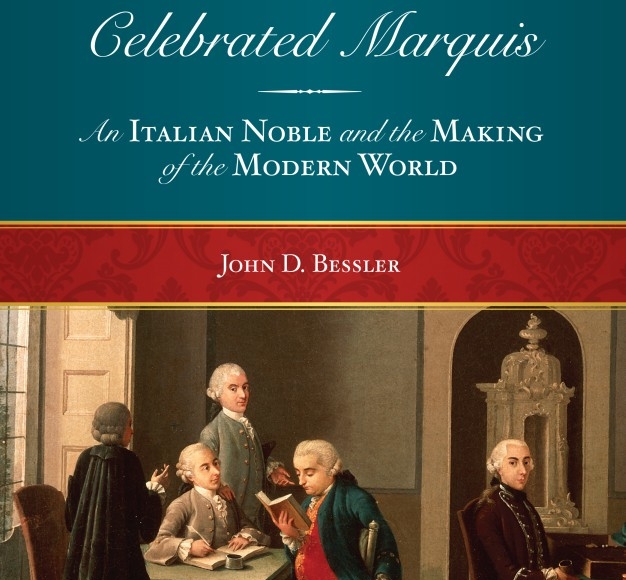Saving Beccaria's Legacy
Professor John Bessler is trying to help Cesare Beccaria – even though he’s been dead for over two hundred years. A man who strove to change the public attitude towards the death penalty, torture, rights of the poor, and more, Beccaria is not a household name unlike many of his English and French-speaking contemporaries of the 18th century.
John Bessler – a visiting scholar at the Human Rights Center at the University of Minnesota Law School – wants to change that.

“Part of the book is to sort of rehabilitate his legacy by letting people know about who he was,” Bessler says. The book is The Celebrated Marquis: An Italian Noble and the Making of the Modern World, authored by Bessler and released this month (February 2018). It is as much a biography of Beccaria as it is a story of the influence of his ideas and how they shaped the world we know.
“A lot of the ideas you see in things like the Universal Declaration on Human Rights and the Convention Against Torture, aresomething that has a foundation in the Enlightenment and Beccaria's work.” Beccaria, a pioneer of social and economic justice, first rose to prominence for his views on criminal justice. An advocate for the “proportionality of punishment,” “Beccaria was also the first person to make a comprehensive case against the death penalty.”
“In the field of human rights, the modern anti-death penalty movement traces its origins back to his book, On Crimes and Punishments. . . George Washington bought a copy of On Crimes and Punishments in 1769. Jefferson bought a copy that same year and we know that he copied more than two dozen passages from Beccaria’s book in the original Italian into his commonplace book, which is how lawyers learned the law back then.”
Originally published in Italian in 1764, “Beccaria’s writings were being read from Canada all the way down to Argentina and of course in Europe, where his book was very quickly translated in 22 languages . . . It really becomes the equivalent of a New York Times bestseller.”
However, Beccaria was concerned with more than just criminal justice – he was also an economist. Beccaria’s foundation in economics led him to wonder, “How do you make members of society more broadly happier?”
Professor Bessler told me, “These are all really important ideas for people to understand in terms of the human rights field because [Beccaria] was talking about things like human happiness and getting rid of the death penalty, getting rid of torture, and even talking about… subsidized healthcare for the poor, conservation – so if you cut down a tree, you should plant a tree. These were all things [Beccaria was talking] about in the 18th century.”
So how come an intellectual whose book was read worldwide in the 18th century came to be overlooked and lost in the fissures of history? The answers are in Professor Bessler's The Celebrated Marquis: An Italian Noble and the Making of the Modern World, available on Amazon now.
Professor John Bessler is a visiting scholar at the Human Rights Center at the University of Minnesota Law School. He has taught law at the University of Baltimore School of Law, the Georgetown University Law Center, The George Washington University Law School, Rutgers School of Law, the University of Minnesota Law School, and the University of Aberdeen in Scotland. He is also of counsel at the Minneapolis law firm of Berens & Miller, P.A., and is the author of a forthcoming book, The Celebrated Marquis: An Italian Noble and the Making of the Modern World. That book will be published in January 2018 by Carolina Academic Press in Durham, North Carolina. It is a biography of Cesare Beccaria (1738-1794), an Italian philosopher and economist who profoundly shaped the history of human rights and law and economics. Called the "Italian Adam Smith," Beccaria taught economics in Milan before the publication of Adam Smith's The Wealth of Nations. John's prior book on Cesare Beccaria's influence on America’s founders, The Birth of American Law: An Italian Philosopher and the American Revolution (2014), won three book awards. Among those: the prestigious Scribes Book Award, an annual award presented since 1961 by The American Society of Legal Writers. That award is given out "for the best work of legal scholarship published during the previous year." A link to John’s forthcoming book: http://www.cappress.com/books/isbn/9781611637861/The-Celebrated-Marquis. John previously taught the capital punishment seminar at the University of Minnesota Law School, and he recently published The Death Penalty as Torture: From the Dark Ages to Abolition (2017). A description of that book can be found here: http://www.cap-press.com/books/isbn/9781611639261/The-Death-Penalty-as-Torture.



